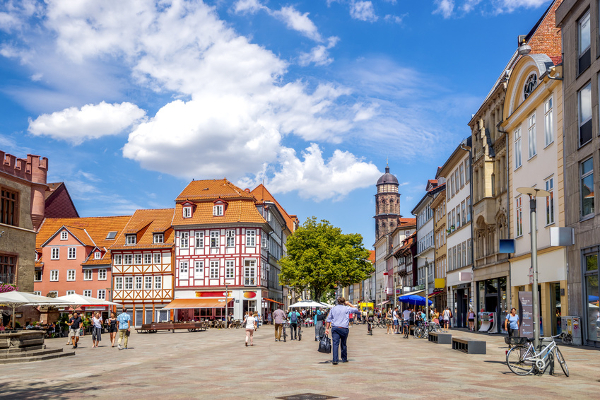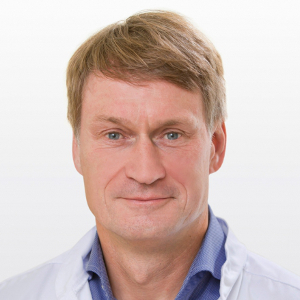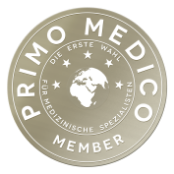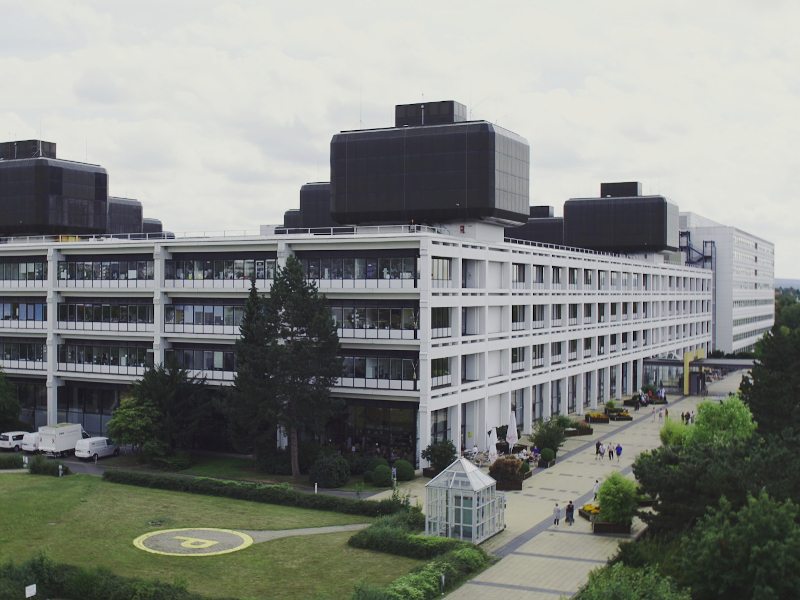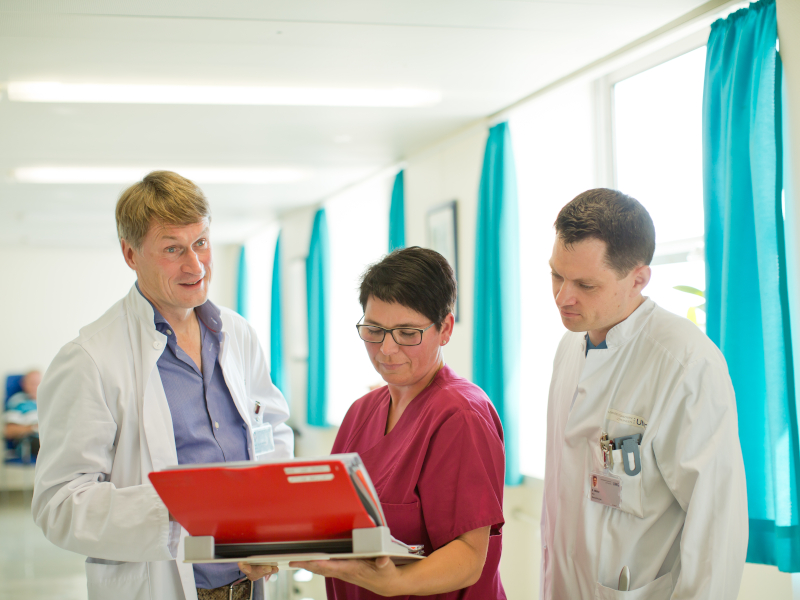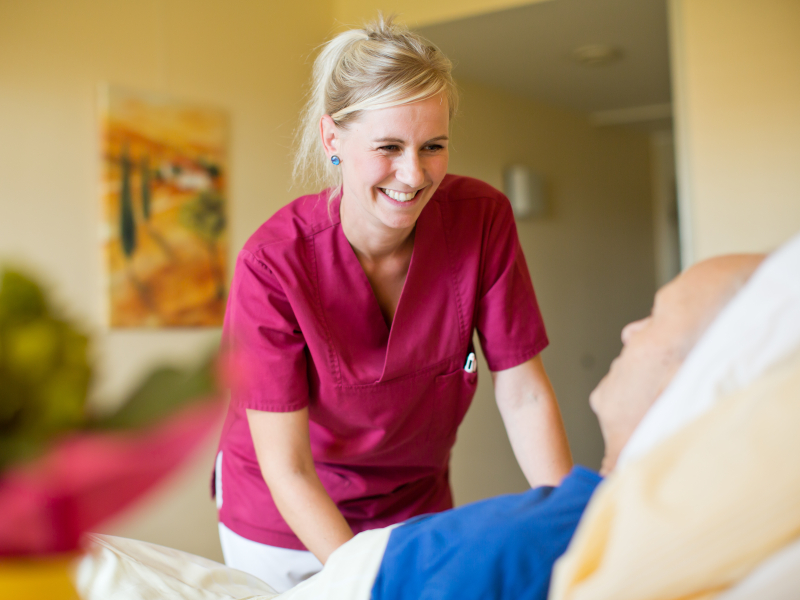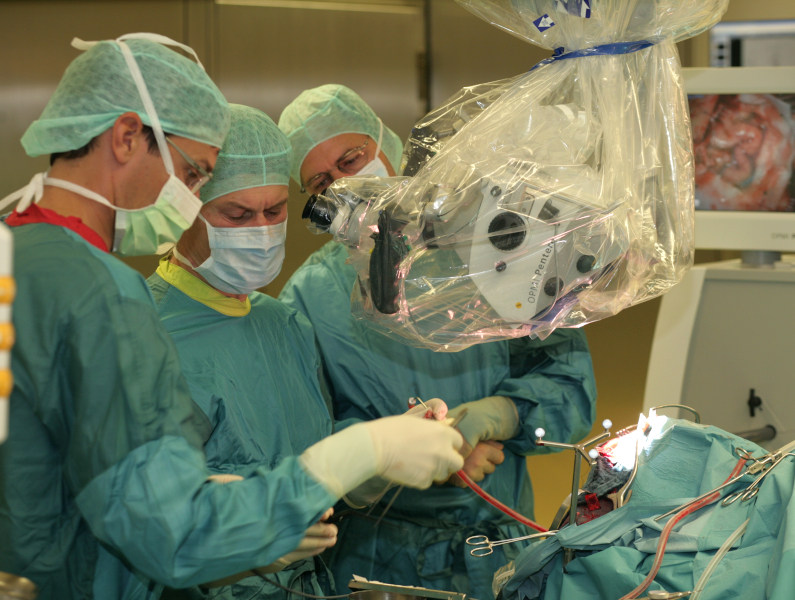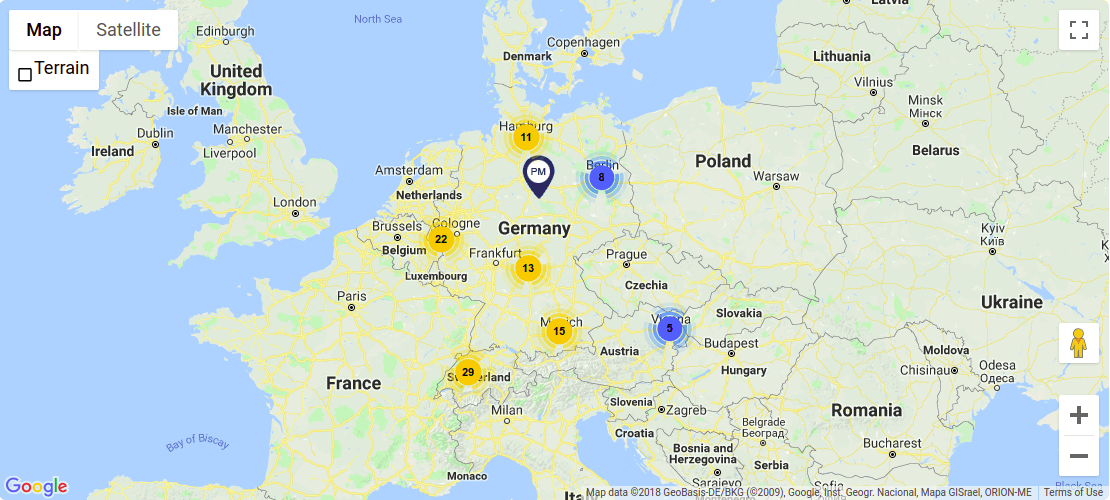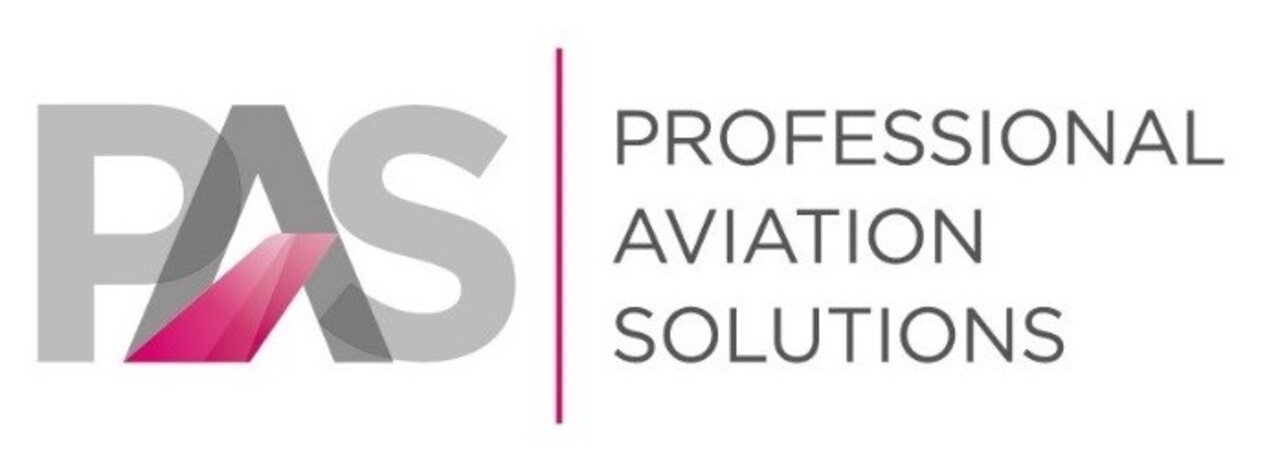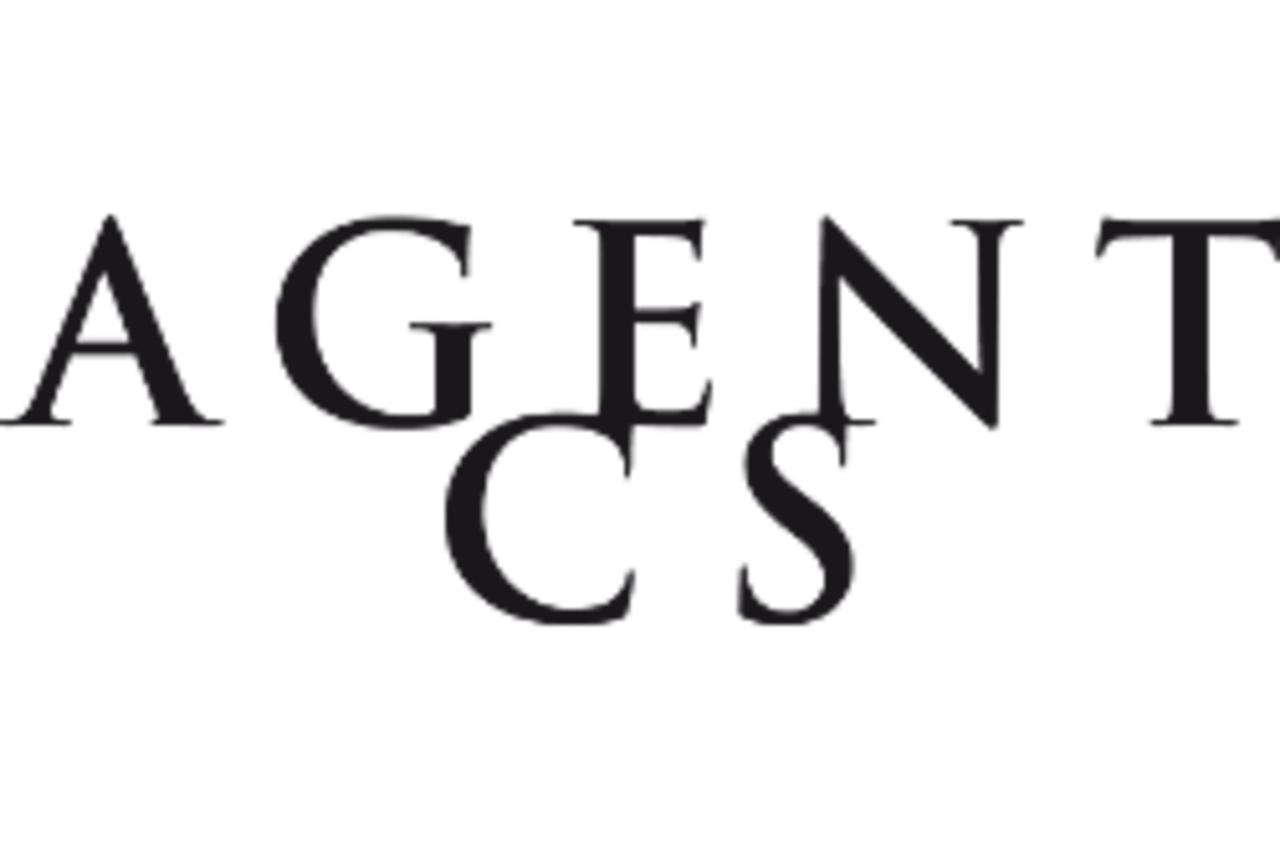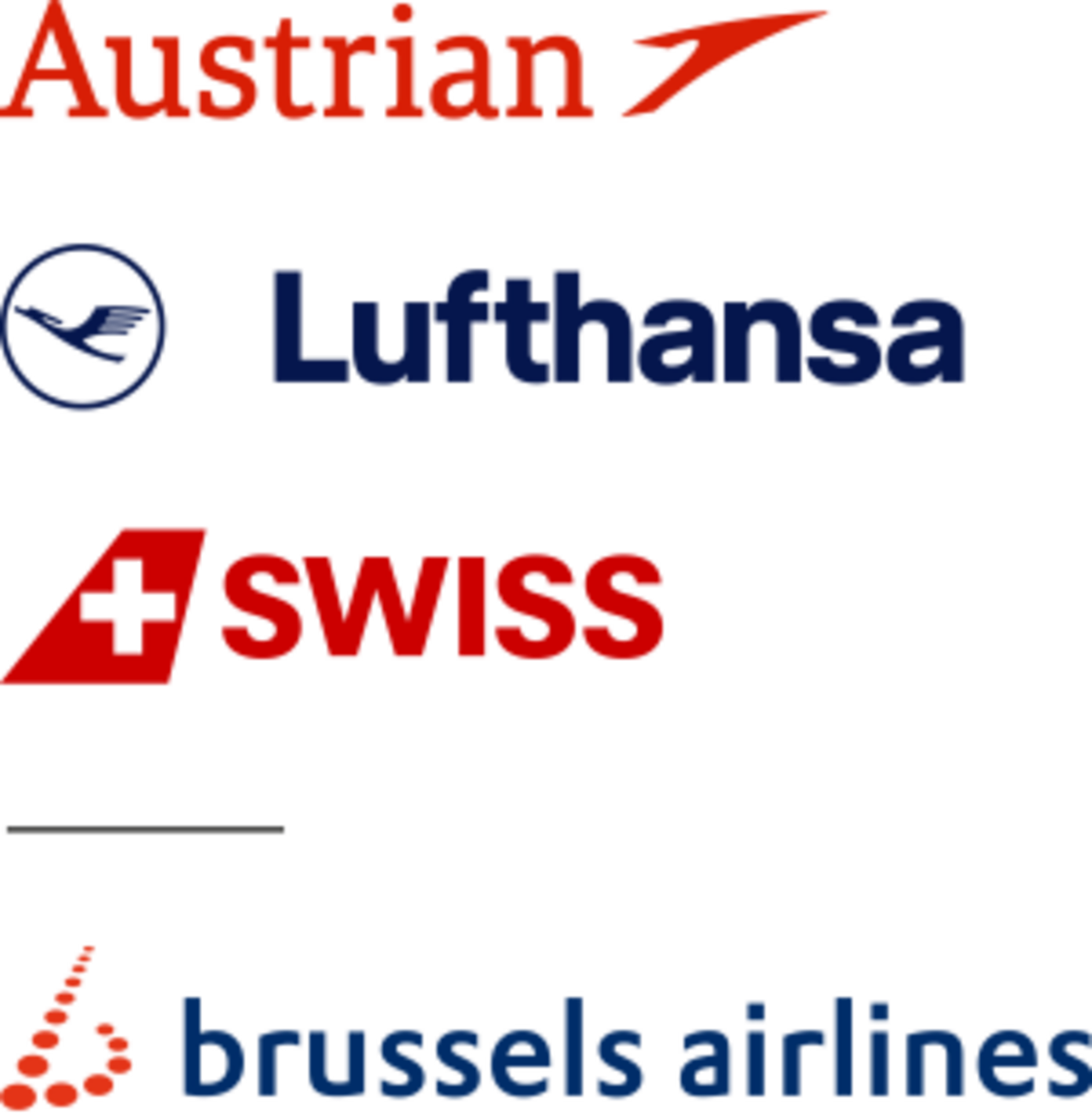Neurosurgery in Göttingen: Prof. Dr Veit Rohde
Treatment focus
- Vascular neurosurgery: vascular diseases (aneurysms, brain haemorrhages, angiomas, cavernomas)
- Oncological neurosurgery: tumours of the brain and spinal cord
- Functional neurosurgery (Parkinson's disease, osteoporosis, chronic pain)
- Spinal neurosurgery (herniated discs, spinal canal stenosis, corrective reinforcement surgery)
- Pain therapy
- Paediatric neurosurgery
Contact
Göttingen University Hospital
Neurosurgery Clinic
Robert-Koch-Straße 40, D-37075 Göttingen
P: +49 551 89 71 4056 F: +49 551 39 61778
Consultation Hours:
Private consultation hours:
Tuesday 2:00 pm – 3:00 pm
Wednesday 12:00 pm – 3:00 pm
By appointment

Medical Range
Range of Diagnostic Services
- Second opinions
- Intraoperative monitoring
- Electrophysiological studies
- Electromyography (EMG, investigation of electrical muscle activity)
- In collaboration with the neurologists: non-invasive and invasive monitoring of brain waves (EEG) for epilepsy
- In collaboration with the radiologists: CT (computed tomography), MRI (magnetic resonance imaging), angiography (vascular imaging)
Range of Therapeutic Services
Vascular Neurosurgery
- Aneurysms: clipping, coiling (in collaboration with the neuroradiologists)
- Arteriovenous malformations, angiomas: surgical removal, embolisation
- Cavernomas: surgical removal
- Dural arteriovenous fistulas: surgery, embolisation
- "Bloody" strokes, brain haemorrhages, haemorrhagic strokes: minimally invasive catheter treatment, surgical removal
- Stroke, ischaemic stroke
Functional Neurosurgery
- Movement disorders, e.g., Parkinson's disease: deep brain stimulation (DBS), brain pacemakers
- Epilepsy: vagus nerve stimulators, surgical removal of the epileptic focus
- Spasticity: drug pumps
Spinal Neurosurgery
- Disc prolapses: microsurgical treatment
- Spinal canal stenosis: microsurgical dilation of the spinal canal
- Spinal stabilisation
- Osteoporosis: kyphoplasty, straightening and cementing of fractured vertebral bodies
- Vertebral metastases: surgery, radiofrequency ablation
Oncological Neurosurgery
- Tumour removal
- Interdisciplinary care at the University of Göttingen Cancer Centre
- In collaboration with the radiation therapists: irradiation
- Chemotherapy
Pain Therapy
- Chronic pain: in the event of insufficient pain reduction by means of medication and other measures, implantation of a "spinal cord stimulator" (SCS electrode), which inhibits the transmission of pain impulses.
Personal information
Prof. Dr Veit Rohde is Clinic Director of the Neurosurgery Clinic at Göttingen University Hospital, one of the largest neurosurgery clinics in Germany.
With expertise, latest technical equipment and best care, Prof. Rohde and his dedicated team treat the entire spectrum of neurosurgical diseases with focus on preserving functions and consistently applying minimally invasive therapy principles.
Neurosurgery in Göttingen: Interdisciplinary Treatment at the Highest Medical Level in Lower Saxony
The Neurosurgery Clinic at the University of Göttingen Medical Centre is one of the largest neurosurgery clinics in Germany. Each year, 5000 outpatients and 2000 inpatients are treated there with about 3000 operations. In order to provide the best possible care for each individual patient, especially in the context of oncological diseases (cancer), Göttingen University Hospital has an interdisciplinary University Cancer Centre (G-CCC). It also collaborates interdisciplinarily closely with other specialist departments.
Due to its high level of expertise and large numbers of cases, its many years of experience and the best medical results, the Neurosurgery Clinic led by Prof. Rohde is a certified centre of the German Society for Neurosurgery in the field of vascular diseases, especially brain haemorrhages ("bloody" strokes).
To guarantee individual and patient-oriented care, Prof. Rohde and his team work closely with rehabilitation centres to ensure the best possible therapy, including during postoperative periods.
Professor Rohde's Treatment Focus
The clinical work of the experienced neurosurgeon Prof. Rohde focuses primarily on interventions in the region of brain vessels (vascular neurosurgery), surgery at the base of the skull, and operations on highly eloquent regions of the brain. In the field of neurosurgery, brain regions crucial for survival or for a high degree of independence are described as highly eloquent. These high-eloquent regions include, among others, the brain stem, the basal ganglia, and the precentral cortex. As far as possible, Prof. Rohde carries out his surgical procedures in a minimally invasive manner with endoscope-assistance since shorter surgery times and smaller skin incisions lead to less pain after surgery and a shorter period of after-care.
Some important disease patterns Prof. Rohde and his experienced team deal with are illnesses of the vessels of the central nervous system. These conditions primarily include aneurysms, brain haemorrhages, arteriovenous malformations, and cavernomas of the brain and spinal cord. Oncological neurosurgery deals with the treatment of tumours of the brain, spinal cord and its sheaths. To ensure the best possible care, each therapy plan is developed during an interdisciplinary tumour conference.
Patients with movement disorders such as Parkinson's disease or tremors and chronic pain are also treated at the Neurosurgery Clinic. Neuromodulatory methods (deep brain stimulation and spinal cord stimulation) are applied here.
Another focus is placed on spinal surgery. This concerns the treatment of herniated discs, spinal stenosis (narrowing of the spinal canal), and instability of the spine due to accidents, inflammation, and tumours. In the case of osteoporosis, our specialist also carries out bone cement injections in addition to stabilisation procedures.
Brain Aneurysm Therapy
A brain aneurysm is a congenital vascular ballooning in the region of the cerebral arteries that can become symptomatic over the course of a person's life. Because aneurysms are weak spots in the vessel wall, they can cause symptoms or burst due to pressure on the brain tissue. When aneurysms blast, arterial blood flows into the subarachnoid space surrounding the brain filled up with cerebrospinal fluid. A subarachnoid haemorrhage is an absolute emergency and manifests itself, among other things, in thunderclap headaches, impaired consciousness, and even coma.
During the surgical treatment of an aneurysm of the brain vessels, the affected area is enclosed with a clip from the outside and thereby secured. Depending on the location of the aneurysm, a so-called coil embolisation procedure can also be carried out instead of surgery by using a vascular catheter. The question as to which treatment is more suitable is always a decision Prof. Rohde takes in each individual case in close collaboration with neuroradiology specialists and in consultation with the patient. Prof. Rohde and his colleagues have many years of experience in the field of brain aneurysm surgery. In high-risk cases, they also carry out the most modern procedures such as bypass techniques and in 2014, they were the first clinic in Northern Germany to perform this operation during cardiac arrest.
Brain Haemorrhages
High blood pressure over the course of many years can cause degeneration and brittleness of the small arteries in the brain. In case of a "bloody" stroke, a spontaneous bleeding occurs in the brain. Due to the acute increase in pressure, this leads to the death of brain tissue within a very short time. Symptoms in the event of this medical emergency are comparable to "bloodless" strokes – paralysis, impaired speech or even impaired consciousness.
Brain Tumours and Brain Metastases
There are numerous forms of benign and malignant tumours in the region of the nervous system and its surrounding structures. Depending on the type of tumour, these can either be directly cured by surgery, or it is a first step into a larger complex of treatment phase consisting of surgery, chemotherapy, and radiation. Depending on the location of the tumour, surgical intervention can be very complicated as radical tumour removal without leaving long-term effects can be difficult to achieve, especially in the region of the movement centre or speech centre. Prof. Rohde's specialities are these complex interventions in highly eloquent regions. Besides brain tumours, metastases (secondary tumours) are often found in the brain tissue. These are removed during microsurgical procedures and usually irradiated later as well.
Disc Prolapse
The widespread condition of disc prolapse involves parts of the spinal disc between the vertebral bodies which become loose and pressed into direction of the spinal canal where the spinal cord and the nerves branching off from it run through. If there is no improvement, despite conservative measures, or if there are signs of paralysis, it is recommended to treat disc prolapses with surgery. In the Neurosurgery Clinic led by Prof. Rohde, interventions on the spine always take place under the microscope or endoscopically.
A Renowned Academic Team Involved in International Research
From an academic perspective, Prof. Rohde and his team are primarily concerned with vascular neurosurgery (intracerebral haemorrhages, prevention of secondary brain damage after subarachnoid haemorrhages (brain haemorrhages)), and neuro-oncology (tumour diseases of the nervous system). He also conducts research into the electrophysiology of the nervous system and the development and testing of endoscopic techniques in the field of neurosurgery. The Neurosurgery Clinic is constantly participating in various international, multicentric studies. If interested, and if there is an appropriate requirement, patients are welcome to participate in these scientific developments.
Visit the Neurosurgery Clinic's website for more information.
Curriculum Vitae
| 1981 – 1987 | Study of Human Medicine at the Johannes Gutenberg University in Mainz |
| 1988 | Licence to practise medicine |
| 1989 | Doctorate on the topic “Investigation of the use of intravenous, high-dose cortisone therapy (IV high-dose prednisone therapy) for chronic polyarthritis with special consideration for the immune status” |
| 1989 – 1991 | Worked in the Neurosurgery Clinic of the Eberhard-Karls-University, Tübingen |
| 1991 – 1994 | Worked in the Neurosurgery Clinic of the City Clinics in Duisburg |
| 1994 – 2005 | Worked at the Neurosurgical University Clinic of RWTH Aachen University |
| 1995 | Qualification as a specialist doctor |
| 1999 | Habilitation on the topic "Contributions to the localisation and functional testing of the corticospinal system using repetitive magnetic stimulation before and during neurosurgical procedures" |
| 2003 | Qualification in special neurosurgical intensive care medicine |
| 2005 | Adjunct Professor |
| 08.08.2005 – present | W3 professorship in Göttingen |
Team

Dr Tammam Abboud
Senior Physician
PD Dr Christian von der Brelie
Senior Physician
Dr Ingo Fiss
Executive Senior Physician
Dr Vesna Malinova
Senior Physician
Prof. Dr (MBA) Dorothee Mielke
Senior Physician
PD Dr Björn Sommer
Senior Physician
Dr Levent Tanrikulu
Senior Physician
Extras
Where possible, Prof. Rohde also provides second opinions online in collaboration with his experienced team of senior physicians.
| Göttingen Railway Station/Central Bus Station | 3,5 km |
| Kassel Airport | 67,0 km |
| Hanover Airport | 141,0 km |
Information about Göttingen
Göttingen is a lively science city in the middle of Germany. The unique thing about it is that 30,000 students attend the city's universities and shape its young flair.
But more than 1000 years of history have also left their mark. Middle-age churches, half-timbered houses, and traditional university buildings characterize the cityscape. Since its foundation in the 18th century, the Georg-August University has produced many influential scientists.
Göttingen is also known far beyond its borders as a festival city, where theater, literature, and music have a special significance.
